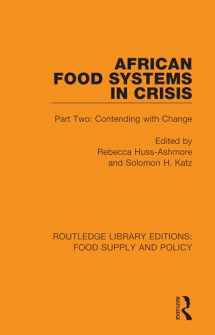
African Food Systems in Crisis: Part Two: Contending with Change (Routledge Library Editions: Food Supply and Policy)
Book details
Summary
Description
Originally published in 1991. Commissioned by the Task Force on African Famine of the American Anthropological Association, this the second part of a project examining the causes of food system failure in Africa and the effects of attempts to remedy the situation. It evaluates the often-retrogressive results of foreign aid to African nations and offers an anthropological perspective on how to reverse this trend.
The contributors emphasize integrating all development programs with the regional customs and traditions already in place that have thus far allowed its people to cope with food and water shortages. In the past, various strategies have failed due to misunderstandings and incorrect assumptions concerning gender roles, food consumption habits, social relations, kinship networks, land use and government function. New understanding of the culture must be complemented with multifaceted programs incorporating education, a concern for grass-roots opinion and control, attention to production and consumption patterns, and various forms of broad-spectrum integrated development.
The uniqueness research is recommended for all who are concerned about worldwide malnutrition and those who understand the need to recognize local traditions as resources that must be included in any successful development program.


We would LOVE it if you could help us and other readers by reviewing the book
Book review



